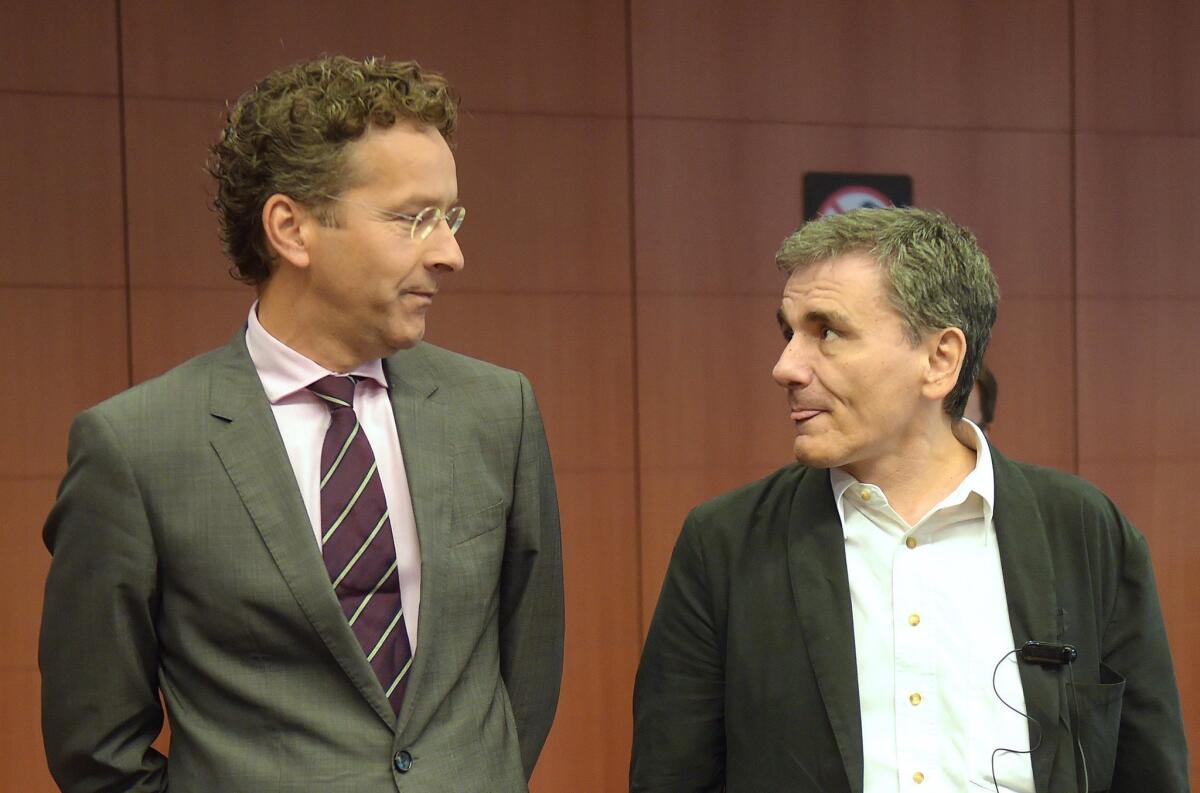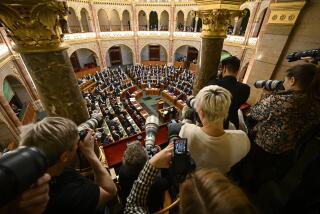Greece’s European partners back latest bailout deal

Eurogroup President and Dutch Finance Minister Jeroen Dijsselbloem, left, and Greek Finance Minister Euclid Tsakalotos talk Aug. 14 during a Eurogroup meeting at the European Union headquarters in Brussels.
- Share via
Reporting from London — Europe’s top finance officials agreed to save Greece from a disastrous bankruptcy for the third time in five years, signing off Friday on a $95-billion bailout package after months of infighting, brinksmanship and the near-death of the Greek banking system.
Now comes the hard part.
The rescue deal is laden with further spending cuts, tax hikes, pension reductions and other reforms, such as opening up closed professions and liberalizing labor regulations, that the Greek government must impose on an economy already languishing in the deepest depression any advanced country has suffered since World War II.
Athens has pledged to implement the changes in exchange for emergency loans even though the prime minister declares publicly that he disagrees with them.
“It’s an ambitious reform package,” said Jeroen Dijsselbloem, who leads the group of finance ministers from the Eurozone, the 19 countries -- including Greece -- that use the euro currency. “It addresses the main challenges both on reaching sound public finances to return to growth but also structural policy frameworks to enhance competitiveness.”
The ministers’ seal of approval paves the way for the bailout to be in place in time for Greece to make an important debt repayment due next Thursday. While some national parliaments still must vote on the rescue package before then – most notably Germany, which has taken a hard line on a new bailout – their assent is expected.
Besides the debt payment, the first tranche of about $29 billion in emergency loans will cover an $11-billion infusion of cash for Greece’s nearly depleted banks.
The agreement, reached in Brussels, also calls for the establishment of a special fund for raising billions of dollars for Greece’s dwindling public coffers by selling state-owned assets, such as the electricity grid. And, in a victory for Greek Prime Minister Alexis Tsipras, Dijsselbloem said Athens’ creditors would look at ways to restructure the country’s crushing load of public debt, which virtually all analysts say is unsustainable.
Friday’s announcement helps pull Greece further away from the abyss into which it stared only a month ago: the collapse of its banks, a catastrophic default and the country’s expulsion from the Eurozone. The new plan is designed to cover Greece’s financing needs for the next three years.
But the rescue funds are contingent on Athens fulfilling its end of the bargain, which could spark fresh flare-ups of the crisis if quarterly reviews by international monitors find Greece falling short.
Many analysts, and even some Eurozone finance ministers themselves, have expressed skepticism that Tsipras will succeed where his predecessors failed in executing the tough measures demanded of him.
On Friday morning, just hours before the finance ministers’ meeting, the Greek Parliament approved another large batch of those measures, including increasing personal and business taxes, raising the retirement age for some workers and slashing spending in areas such as defense. The vote capped the latest marathon session to deal with up-front legislation demanded by Eurozone nations before they would agree to another bailout.
But enough lawmakers from Tsipras’ left-wing Syriza party rebelled against him that he may soon be forced to call a vote of confidence or a snap election. The continued political instability will only make implementing the reforms and getting Greece back on track even harder.
After hours of rancorous debate, Tsipras took to the floor to defend his acquiescence to the creditors’ harsh terms, saying that the alternative would have been certain catastrophe.
“We took a painful decision of responsibility,” Tsipras said. “We took the decision to remain alive instead of committing suicide and complaining how unfair it was.”
But the bailout entails a significant loss of sovereignty for Athens. In addition to enacting the reforms contained in the agreement, which go into as deep detail as milk prices and Sunday opening hours for shops, Greece must also run future financial and economic legislation by its international lenders for their prior approval, almost as if it were a ward of its creditors and not an autonomous state.
“I feel ashamed for you. We no longer have a democracy … but a Eurozone dictatorship,” Panagiotis Lafazanis, the former energy minister and a Syriza dissident, said before Friday’s vote.
Lafazanis and other members of Syriza’s far-left faction say they intend to start a new popular movement true to the anti-austerity principles that brought Syriza to power in January. But they have stopped short of saying they would leave the party altogether.
Follow @HenryHChu on Twitter for news out of Europe
More to Read
Sign up for Essential California
The most important California stories and recommendations in your inbox every morning.
You may occasionally receive promotional content from the Los Angeles Times.














